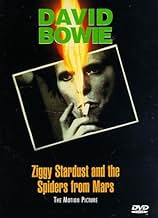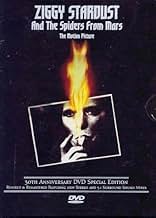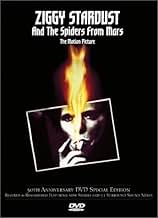AVALIAÇÃO DA IMDb
7,5/10
3,1 mil
SUA AVALIAÇÃO
David Bowie se apresenta como seu alter ego Ziggy Stardust pela última vez no Hammersmith Odeon, em Londres, em 3 de julho de 1973.David Bowie se apresenta como seu alter ego Ziggy Stardust pela última vez no Hammersmith Odeon, em Londres, em 3 de julho de 1973.David Bowie se apresenta como seu alter ego Ziggy Stardust pela última vez no Hammersmith Odeon, em Londres, em 3 de julho de 1973.
Mick Woodmansey
- Self - Drums
- (as Mick Woodmansy, Woody Woodmansey)
Angie Bowie
- Self
- (não creditado)
Maureen Starkey
- Self
- (não creditado)
Ringo Starr
- Self
- (não creditado)
Avaliações em destaque
Decent capture of David Bowie at his creative, flamboyant best. Good concert, and it's not all about Bowie. Mick Ronson's guitaring almost steals the show.
Interesting behind-the-scenes footage adds a new, more personal, aspect to the live concert genre. Could have done with more of that though, as the behind-the-scenes stuff is fleeting, and sometimes seems token. Maybe some footage of practices and sound checks, or interviews with Bowie, would have been in order.
Not perfect though. Production quality is quite raw and rough. Sound quality is variable.
A must-see for all David Bowie fans.
Interesting behind-the-scenes footage adds a new, more personal, aspect to the live concert genre. Could have done with more of that though, as the behind-the-scenes stuff is fleeting, and sometimes seems token. Maybe some footage of practices and sound checks, or interviews with Bowie, would have been in order.
Not perfect though. Production quality is quite raw and rough. Sound quality is variable.
A must-see for all David Bowie fans.
but I like it. This is a terrific concert recorded 30 years ago by Bowie. Considering that Bowie is in his 50's now and still recording and touring this is an excellent opportunity to see him in his prime. His voice is in great shape & the songs are first rate. Ziggy is one of the peaks in Rock and Roll history. Also Mick Ronson is one of the greatest rock guitarists ever. Much has been made of the costumes & Bowie's use of mime etc. but it is the music which carries the day.
D A Pennebaker had already filmed icons like Dylan and Lennon before getting the gig to film David Bowie's "farewell" concert at London Hammersmith Odeon in July 1973. Bowie was huge in Britain at the time but had yet to break America which makes me tend to think the assignment came to him rather than the other way round.
Actually as a great fan of glam rock back in the day (being 13 at the time of the movie's shooting date, how could I not be, 1972-73, being glam's heyday here), I do remember the fuss about this being Bowie's last show, giving the concert great curiosity, not to mention envy value at the time to fans in the sticks like me. To discover that this historic show was captured in full was a great and welcome surprise to me.
That said, the film-maker's approach to the concert is pretty conservative actually as we get a little bit of pre-show scene-setting, with Bowie getting made-up in his dressing room, chatting to his wife Angie, while cutting in scenes of his adoring, often lookalike fans outside. Without too much delay, however, the show's on and Bowie and his band, the latter brilliantly led by Mick Ronson on lead guitar, tear into a great set, culminating in the famous, if misleading "This is our last show" quote and the bathetic euphoria which greets final song "Rock and Roll Suicide".
In between, we get four costume changes, a goodly selection of numbers from his just-released "Aladdin Sane" album (but no "Jean Genie" sadly!), plenty, naturally from the "Ziggy Stardust" album but also tracks from some of his earlier albums. Unlike other rock-movies by the Rolling Stones and Led Zeppelin, Bowie and the band are on fine form, with confidence exuding from the singer's every phrase and move.
Yes, some tracks go on too long, it was a shame that two of his best tunes ("All The Young Dudes" and "Oh! You Pretty Things) get rather thrown away in a medley, but against that there are great covers of Jacques Brel's "My Death" and the Velvets' "White Light White Heat", although I'm still undecided at what to make of the somewhat ridiculous mine-sequence during an almost never-ending version of "Wild Eyed Boy From Freecloud". Pennebaker's editing is adequate if, as I say, unimaginative, making the most of the no doubt limited camera numbers available to him, but thereafter just cutting from Bowie and Ronson (you barely see the rest of the band) to the ecstatic audience. Somehow Ringo Starr, director of Bowie friend and rival Marc Bolan's "Born To Boogie" movie the previous year, appears in Bowie's dressing room between songs casting an envious eye no doubt on a missed opportunity behind the lens again.
Anyway, I was rapt by this exciting glimpse of a top artist on top form, masterminding his destiny to a "T", delivering a great rock and roll show in the process.
What of course differentiates this show to contemporary rock concerts is that Bowie treats the performance itself as musical theatre, quite literally, a performance artist if ever there was one.
Actually as a great fan of glam rock back in the day (being 13 at the time of the movie's shooting date, how could I not be, 1972-73, being glam's heyday here), I do remember the fuss about this being Bowie's last show, giving the concert great curiosity, not to mention envy value at the time to fans in the sticks like me. To discover that this historic show was captured in full was a great and welcome surprise to me.
That said, the film-maker's approach to the concert is pretty conservative actually as we get a little bit of pre-show scene-setting, with Bowie getting made-up in his dressing room, chatting to his wife Angie, while cutting in scenes of his adoring, often lookalike fans outside. Without too much delay, however, the show's on and Bowie and his band, the latter brilliantly led by Mick Ronson on lead guitar, tear into a great set, culminating in the famous, if misleading "This is our last show" quote and the bathetic euphoria which greets final song "Rock and Roll Suicide".
In between, we get four costume changes, a goodly selection of numbers from his just-released "Aladdin Sane" album (but no "Jean Genie" sadly!), plenty, naturally from the "Ziggy Stardust" album but also tracks from some of his earlier albums. Unlike other rock-movies by the Rolling Stones and Led Zeppelin, Bowie and the band are on fine form, with confidence exuding from the singer's every phrase and move.
Yes, some tracks go on too long, it was a shame that two of his best tunes ("All The Young Dudes" and "Oh! You Pretty Things) get rather thrown away in a medley, but against that there are great covers of Jacques Brel's "My Death" and the Velvets' "White Light White Heat", although I'm still undecided at what to make of the somewhat ridiculous mine-sequence during an almost never-ending version of "Wild Eyed Boy From Freecloud". Pennebaker's editing is adequate if, as I say, unimaginative, making the most of the no doubt limited camera numbers available to him, but thereafter just cutting from Bowie and Ronson (you barely see the rest of the band) to the ecstatic audience. Somehow Ringo Starr, director of Bowie friend and rival Marc Bolan's "Born To Boogie" movie the previous year, appears in Bowie's dressing room between songs casting an envious eye no doubt on a missed opportunity behind the lens again.
Anyway, I was rapt by this exciting glimpse of a top artist on top form, masterminding his destiny to a "T", delivering a great rock and roll show in the process.
What of course differentiates this show to contemporary rock concerts is that Bowie treats the performance itself as musical theatre, quite literally, a performance artist if ever there was one.
Don't come expecting plot: Ziggy Stardust and the Spiders from Mars is just a concert film, recorded at the last show of David Bowie's "Ziggy Stardust" tour at the Hammersmith Odeon in London, July 3rd, 1973. However, to say it's _just_ a concert film doesn't quite cover the bases... Let's be blunt: if you like the idea of the 26-year-old Bowie in a skimpy satin tunic and boots, growling into a microphone and spreading his thighs for the fans, then you're going to love this film. If that idea does nothing for you -- and, frankly, if it doesn't then I think you're missing one of life's great kicks -- then you're not the target audience.
I should add that there are also five or six costume changes, some amusing backstage conversation, plenty of shots of the audience (apparently mostly fourteen-year-old girls in varying states of sexual ecstasy), and some rather scorching extended solos from lead guitarist Mick Ronson. Oh, yes: and I shouldn't forget to mention that Bowie's showmanship is amazing and the musical performances range from interesting to excellent -- there's a truly fabulous version of "Cracked Actor," for instance, with Bowie maintaining a surprising level of fierceness while playing harmonica and draped in a satin kimono.
Beyond the music -- "Ziggy" staples like "Changes," "Space Oddity," "My Death," "All The Young Dudes," etc., as well as covers of the Rolling Stones' "Let's Spend The Night Together" and Lou Reed's "White Light, White Heat" -- the visual imagery is what really makes this interesting. The come-hither hip-shaking of "Moonage Daydream," or the guitar-sex-flavored performance of "Time" (with Bowie in unitard, garter and feather boa), all make this a fantastic education in what Bowie's original aesthetic -- and sex appeal -- were all about.
Personally, I think this is a _Gesamtkunstwerk_ -- that is, a total work of art -- and should probably be beamed into outer space for the aliens to have fun with. But you can probably figure out which segment of the audience I fall into.
P.S.: By the by, Todd Haynes' Velvet Goldmine made a hell of a lot more sense after I'd seen this film.
I should add that there are also five or six costume changes, some amusing backstage conversation, plenty of shots of the audience (apparently mostly fourteen-year-old girls in varying states of sexual ecstasy), and some rather scorching extended solos from lead guitarist Mick Ronson. Oh, yes: and I shouldn't forget to mention that Bowie's showmanship is amazing and the musical performances range from interesting to excellent -- there's a truly fabulous version of "Cracked Actor," for instance, with Bowie maintaining a surprising level of fierceness while playing harmonica and draped in a satin kimono.
Beyond the music -- "Ziggy" staples like "Changes," "Space Oddity," "My Death," "All The Young Dudes," etc., as well as covers of the Rolling Stones' "Let's Spend The Night Together" and Lou Reed's "White Light, White Heat" -- the visual imagery is what really makes this interesting. The come-hither hip-shaking of "Moonage Daydream," or the guitar-sex-flavored performance of "Time" (with Bowie in unitard, garter and feather boa), all make this a fantastic education in what Bowie's original aesthetic -- and sex appeal -- were all about.
Personally, I think this is a _Gesamtkunstwerk_ -- that is, a total work of art -- and should probably be beamed into outer space for the aliens to have fun with. But you can probably figure out which segment of the audience I fall into.
P.S.: By the by, Todd Haynes' Velvet Goldmine made a hell of a lot more sense after I'd seen this film.
Bowie is clearly enjoying himself here, although today he claims to find this record of the Spiders final show unwatchable. The costuming IS spectacularly dated and Ziggy's antics do more to camp up a storm than forewarn of an imminent apocalypse. Aside from the music though, there is more going on here than silly, decadent posturing. Backstage musings by Bowie are suggestive of why he is not merely a relic from a past era: there is inherent tension between the public persona and the demand to discover the "real" Bowie. Rock music has since split into 2 positions along these lines: for the most part, the English traditions of camp and irony have served as a distancing device from the demands of an "authentic" self which can impose on others in an intrusive way- Jewel's folk music/"Knight Without Armor" is merely the latest manifestation of the latter tendency (also, despite the hatred of hippies, Nirvana ironically shared their "no hang ups" philosophy in their "Come As You Are" period). Ziggy was, at the time, the most extreme movement away from the "authenticity" of Woodstock Nation in which there was nothing separating the performer and the audience...been an "alien being" also guaranteed a spectacular show for record buyers who may otherwise have had little interest in live music given the high fidelity improvements in recording technology and home sound systems which were starting to become available. It is the irresolvable tension between these two tendencies toward camp/authentic which helps generate the excitement of the audience captured in this film, and which can still inspire interest and enjoyment today.
Você sabia?
- CuriosidadesJeff Beck guested on guitar in two songs and was supposed to have been in the film, but asked not to appear in it because he felt his solos and his appearance, looking more like a '60s blues rocker than Bowie and the Spiders' theatrical outfits didn't quite fit the movie. His performances have been added to the film for its 50th anniversary re-release.
- Citações
David Bowie: What do you know about make-up? You're Just a Girl.
- Versões alternativasThe 50th anniversary re-release has been restored in 4K picture and sound, and features two previously un-released songs featuring Jeff Beck in the encore (specifically "The Jean Genie" and "Round and Round").
- ConexõesEdited into In Concert: Bowie '73 with the Spiders from Mars (1974)
Principais escolhas
Faça login para avaliar e ver a lista de recomendações personalizadas
- How long is Ziggy Stardust and the Spiders from Mars?Fornecido pela Alexa
Detalhes
- Data de lançamento
- País de origem
- Idioma
- Também conhecido como
- Bowie '73 with the Spiders from Mars
- Locações de filme
- Empresas de produção
- Consulte mais créditos da empresa na IMDbPro
Bilheteria
- Faturamento bruto nos EUA e Canadá
- US$ 162.547
- Fim de semana de estreia nos EUA e Canadá
- US$ 6.816
- 14 de jul. de 2002
- Faturamento bruto mundial
- US$ 565.228
Contribua para esta página
Sugerir uma alteração ou adicionar conteúdo ausente


























